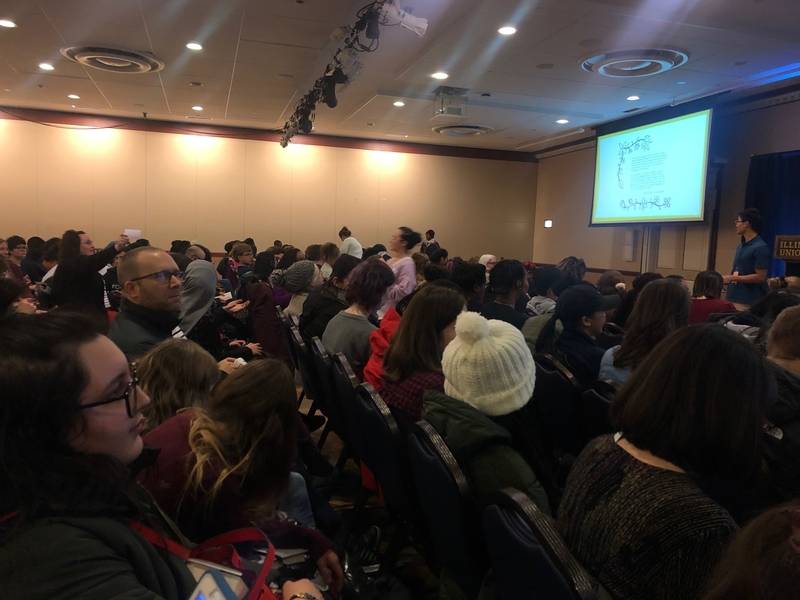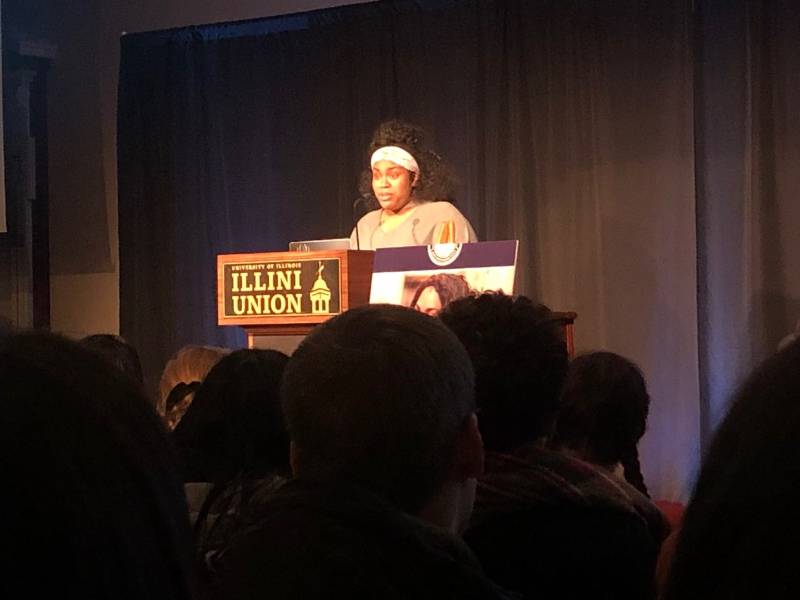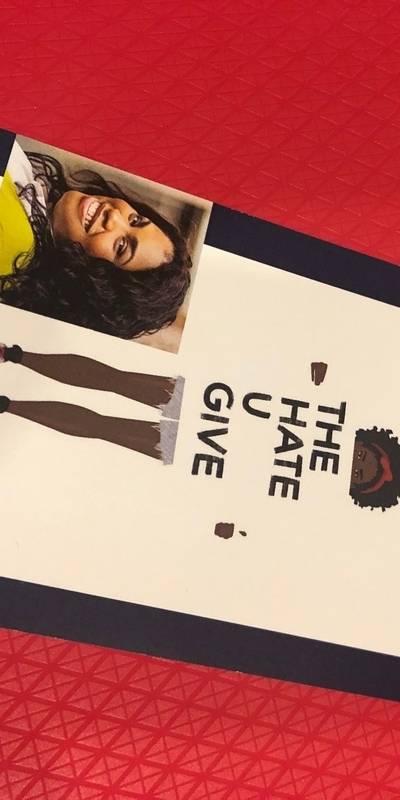Did you hear about the rose that grew
from a crack in the concrete?
Proving nature’s laws wrong it
learned to walk without having feet.
Funny it seems, but by keeping its dreams,
it learned to breathe fresh air.
Long live the rose that grew from concrete
when no one else ever cared.
This poem was written by Tupac Shakur, and was shared by author Angie Thomas as she spoke to a crowd of students, faculty, and community members last night at the Illini Union. Thomas wrote the New York Times bestselling book (for 99 weeks now) The Hate U Give, which was chosen by the University as its One Book One Campus book selection for 2018-2019. The poem, and the poetry of rap in general was an inspiration to her as she sought to find her voice as a young girl.
Thomas spoke about her upbringing in Jackson, Mississippi (she grew up in the same neighborhood where Medger Evers was gunned down in front of his home), her experience at a mostly white conservative Christian college, and the figures who most influenced her life trajectory with humor, poignancy, and a call to be never be silent when it comes to pushing back against the wrongs you see happening around you.

While I’m certain a majority, if not all of the people, in attendance last night either read the book or watched the film that came out last fall, anyone could’ve sat in that audience and had much to gain from Thomas’ words.
The Hate U Give is a YA novel that is centered around Starr, a 16 year old girl who has one foot in her predominantly black neighborhood and the other in a predominantly white private school, a premise that Thomas drew from her similar college experience. Starr is in the car with a childhood friend, Khalil, when they are pulled over by the police — a scenario that like so many of the real-life encounters between unarmed black men and law enforcement we’ve seen play out in the news — ends in Khalil’s death. The book details the devastating impact this has on Starr, as she deals with the fall out and feels the full effect of the racist reactions from her school “friends” (well he was a drug dealer and why didn’t he just do what he was told), the pressure to speak about the events of the altercation, and the grief of losing her friend. The title is drawn from an acronym Tupac had tattooed across his stomach “THUG LIFE” or “The Hate U Give Little Infants Fucks Everybody.” From the book: “Pac said Thug Life stood for ‘The Hate U Give Little Infants Fucks Everybody. T-H-U-G-L-I-F-E. Meaning what society gives us as youth, it bites them in the ass when we wild out. Get it?'”

While Thomas referenced the book, and spoke to the real life people and circumstances that she drew on for inspiration — the contrasts between her neighborhood and college, a memory of seeing the photo of Emmett Till’s disfigured body for the first time, the words of Tupac, and the death of Oscar Grant in 2009, the comments and microaggressions she absorbed from her white peers, the “code-switching” as she moved through her worlds — her message was one that was relatable whether you were familiar with the book or not. And it’s because we see the themes of the book played out over and over again in our country. She spoke about how writing the story of Starr allowed her to “make the political personal.” The deaths of Oscar Grant, Trayvon Martin, Michael Brown, Sandra Bland, Tamir Rice — while they became political flashpoints for the country as a whole, they affected Thomas personally. She said with each one she thought about how that could have been her cousin, her brother, her friend, and that “as a black woman in America, my EXISTENCE is political.” And she called to all of us in the audience, in particular and perhaps especially those of us whose skin differs from those victims to consider them OUR family as well, and speak up and fight for them as vehemently as we would our own.
As she spoke I couldn’t help but pull up the images of last weekend’s viral videos (which Thomas also briefly alluded to) featuring a MAGA hat clad teen smugly staring down a Native American elder as his similarly decked out buddies cheered and mocked in the background, and how that elder’s very existence is political, and how that white teen now has the backing of a PR firm, and appeared on the Today Show, and got to completely rewrite the narrative. And how after the dust settled and more “context” was given (that still did not excuse their behavior in any way shape or form) they got the benefit of the doubt. Trayvon Martin and Tamir Rice did not get the benefit of the doubt. They didn’t get the opportunity to play the “just a kid” card.
Thomas wrote The Hate U Give for a couple of reasons. First, to create a story that black youth could see themselves in — because she grew up without such a mirror. And second, to create empathy and awareness for the broader audience. As she says, “empathy (not sympathy) is key in fighting for equality and equity” and books are one way to foster that. If you become invested in the life of a character, especially one that is not like you, then you’re taking a step in that direction.
She left us with a challenge, or maybe directive, to be a light in the darkness. May it be so.








